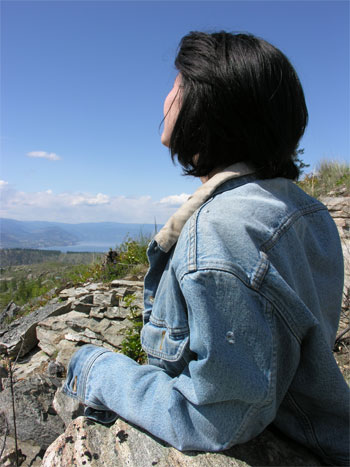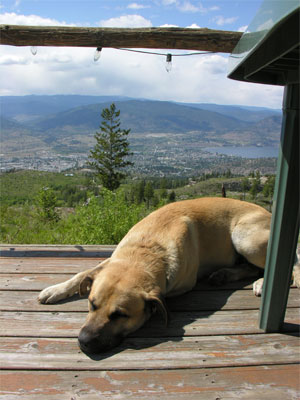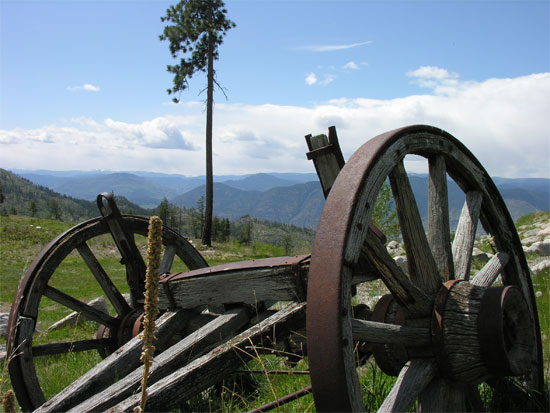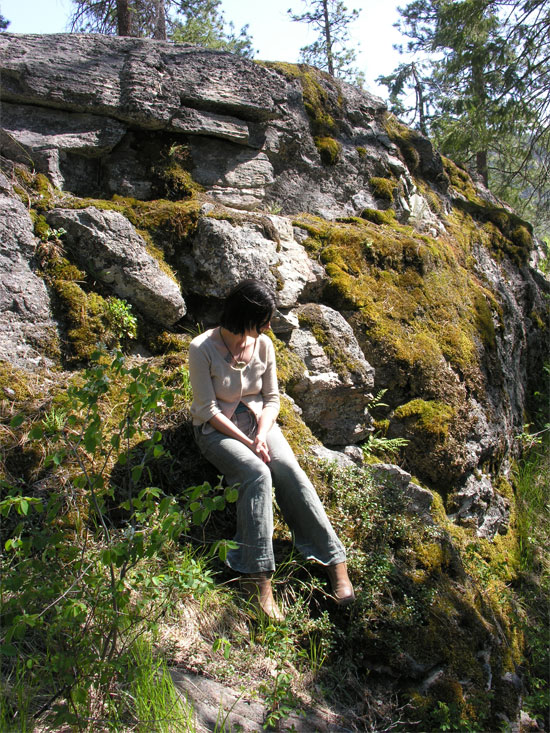INTERVIEW: ‘BIPOLAR DISORDER’
ON BIPOLAR DISORDER
An Interview
 Female – “It used to be called being ‘manic-depressive’, but in the last ten years or so (this interview was done in 2003) it’s been called Bipolar Disorder.
Female – “It used to be called being ‘manic-depressive’, but in the last ten years or so (this interview was done in 2003) it’s been called Bipolar Disorder.
I have Bipolar One, which is the most severe. They classify different gradations of severity on it now, there are levels two, three, and four. Bipolar One is severe enough that it usually winds you up in the hospital. I was hospitalized once, but it wasn’t for the depression; before I was diagnosed, I thought manic-depression was just about depression, I’d had no clue about the manic part.”
BEING ‘DOWN’
“I was always depressed, always on the down side, always fighting the feeling of being down. It was possibly even as a kid, but more pronounced through my teens. I would be really, really upset at things, much more than I should have been.
I remember burning some cookies I was baking when I was six or seven; I just walked around for hours, feeling so devastated, like I can’t do anything right, feeling so bad about this. Then all of a sudden it just ‘lightened’ – like, ‘Wow, my God, I’ve been walking around for two hours thinking this! Gee, that’s probably not right!’ I’d take it so hard, so deeply, just having screwed up over something so small.
The depression was always there.”
BEING ‘UP’
“The manic thing I didn’t even know about; it seemed to come out of left field. It was… amazing.
It happened that intensely only once; I was doing all this spiritual searching – meditating, journaling – and I just brought energy down that I wasn’t ready for. I woke up one morning in this really good mood, where every spiritual thing fell into place – the next thing you know the world is amazing, and the colors are brighter, and the sky is bigger – it never occurs to you that… you’re raving, that you’re not in touch with reality anymore.
Then these things started happening; part of me still thinks that the things I felt were maybe real, but you misconstrue information (and later remember some of the misconstrued information as seeming real). You know – I thought that souls were falling from Heaven to Earth and reincarnating; I thought I was meeting people – like my father – reincarnated. But my father’s very alive, so of course that couldn’t be true. But I thought it. You know, just interpreting things wrong.
I didn’t even see it coming. My Mom noticed there was a big upswing happening, but I didn’t realize right then that she knew anything was wrong. She’s a psychologist, but even so it (the mania) snuck up so fast even she didn’t have a chance to identify it in time to really do anything (to help, as a professional).
I came home late that night, after running around town all day long – just running, doing things, I never had so much energy in my entire life. The rest of the time it’s not enough energy to really do anything, and now suddenly there’s more energy than I can use. It’s like, I could run every place, I could run like a kid. All of a sudden I had the energy to climb everything in sight. Totally wonderful. I came home after being like that all day, and I felt like I had a fever, like I was delirious, but in a wonderful way, you know?
I came home, and my Mom answered the door. She said, ‘You’re not well; there’s something wrong with you’. Of course I thought, ‘Here’s my Mom, worrying about me; I’m twenty-three, this is ridiculous’. You know; ‘I’m fine’.
She said, ‘No, you’re not well. You’re not well. There’s something wrong’. But I’m still saying, ‘I’m fiiine!’ You know, twenty-three years of my Mom just being like a mother worrying about me, all gathered into one single scream – ‘I’m FIIIIINE!’
She said, ‘I’m going to lock myself upstairs. You’re unpredictable. You’re not well’. And I’m shocked; I’m trying to figure out why my Mom thought I might hurt her. I remember I tried talking with her; I said, ‘I’m not going to hurt you’, and I’m still not thinking anything’s wrong. Then she went up and locked herself in her room.
I’m just thinking, ‘Wow, tension’s really high in this house, I’d better get out of here’.”
EVEN DEEPER
“I packed a bag with all these strange things, all these ‘symbolic’ objects, then I hitch-hiked to (a larger city a day’s travel away).
It’s said that when you’re manic (that is, while you’re actually within that state), you can really make things happen. It’s true. You can do anything. I wanted to get to (that city), so I walked downtown (here where she lives), and the place was empty, it was night time. A vehicle pulled up right in front of me, the guy says,’Where are you going?’ I say, ‘(the city)’. He says, ‘So are we’.
When you’re like that, things (that you ‘want’ during that manic state) just all seem to pull together that way for you. Things just fell into my hand.
When I got to that city, I looked up a close friend who lives there that I went to high school with. My family had guessed that I might go there and had already contacted her. They had the police out looking for me, they even went to (a third city they knew she likes to go to) looking for me, thinking I may have gone there.
My friend (in the city she hitch hiked to) lived in a suite below a doctor, so she asked him to come down and interview me. It was all unknown to me, I still had no idea why; I had that pain inside (physical pains she seemed to experience as a side-effect of being suddenly extremely manic) and I thought that’s why the doctor may have been there. When he asked if I’d like to come to the hospital, I thought it was, again, for the pain I was having.”
INTO THE HOSPITAL
“They took me to the hospital, and I spent six days in the ward there. I experienced solitary confinement, total confusion, the whole bit. I felt very tender – the slightest touch or sound would hurt, like when you touch someone’s skin with a pin. That’s what my whole body and mind felt like.
They started to give me anti-psychotic drugs, because that’s what they thought – that I was in a psychotic state. That was really hard for me, when I was first told I was psychotic. That’s such a harsh word… being told you’ve broken with reality. It’s harsh because to them it’s a normal word, they’re using it professionally as a diagnosis, but I’m hearing it socially – the social connotations it brings up.
I remember I thought I was going to be in the psyche ward forever, that I was in hell, literally. I thought that hell, for me, was going to be a sterile, clean, hospital-like ward where they never let you go. Nobody explained anything to me – or if they did, it couldn’t reach me.
Even my Mom couldn’t help there; I asked her if I was going to be allowed to leave, and she said she didn’t know. Of course, she interpreted my questions on a different level – she didn’t know that I meant eternity.”
 WHO SAID IT WAS ALL ‘GOOD’ OR ‘BAD’?
WHO SAID IT WAS ALL ‘GOOD’ OR ‘BAD’?
“I think the most amazing thing about it for me was – there’s this harmful, negative stigma attached to it when people talk about it, yet it was the most powerful thing that’s ever happened in my life.
It only happened that one time, where it was so powerful it was transformational. I came close once at a later time, but then I was trying for it, trying hard. It was so wonderful that I later almost needed for it to happen again. It actually felt quite beautiful, I had a lot of energy, but it was also painful in ways; I felt like I had a fever, felt like I had pain, felt like I had things ‘lodged’ in me, in my body, things I had to work (force) out.
It felt like my body was shutting down; I had an image at one point of being on a ship, but not having solid information… like everything was a dream. I was steering the ship on a beautiful night, all the stars were out, yet it was daytime. I was in the daytime (in reality), yet in my mind night had fallen and I was steering this ship, all alone.
I felt like I was more ‘myself’ than ever in my life before. I felt more ‘here’ (more open to, more ‘with’ the landscape and things all around) than ever before. Very much so. The normal colors were suddenly so amazing, the shadows… I wanted to paint the shadows the way they fell on the wall. At one point I felt like I was moving so fast that it seemed like everyone else was moving in slow motion; that I was invisible so I could walk anywhere.”
INTO ANOTHER HOSPITAL
“Eventually I was air-lifted back to (her home city), and spent a couple weeks in the ward here.
I’m not exactly sure when the Bipolar diagnosis was made, probably sometime around there. My family was just praying that when I was released we could deal with it. In some ways, the ward was a very good thing, but there was the bad, too. Some staff were not so caring or knowledgeable. Some were wonderful.
The rules were rigid for some things. I broke a couple – nothing too serious, just leaving the part of the ward I was assigned, or refusing medication, for examples; they took me back to solitary for awhile. That’s how you learn the rules. It’s almost like you’re a pet. They’re not mean, it’s just that they don’t know any better way to convey the rules when you’re like that. In retrospect, maybe some of the rules weren’t worth putting someone in solitary confinement for…
My Mom was great. Being a psychologist, of course she was the best person to have around. She could hold her own with my doctors, say ‘no’ when she disagreed with them, make them look at things from a different angle. Someone who doesn’t have the training would tend to just accept anything the doctors said as being right. She was very strong, I thought she was just beautiful whenever she walked into the ward.”
KIND OF OUT
“After the ward, I was in a Day Program (where you live at home but visit the ward daily) for two months. I just tried to be ‘normal’ and immerse myself in school again. But that was hard; I was in acting school, and of course they want to mess with your emotions (as part of the acting studies). That’s why I eventually gave up acting.
A funny thing: I saw ‘The Matrix’ (the movie) about a month after I got out of the hospital. Oh, my God! My brain reeled after that; just so much stimulation, and so many ideas (regarding mixed realities). I couldn’t quite take it all in. And all the violence in the movie – normally I can handle it all right, but when I was still in the aftermath of trying to figure out what was happening with me – it wasn’t the perfect time to see a movie like that.
I delved into more spirituality; so much archetypal stuff came up. I’ve noticed that’s a real common thing with people who go through something this powerful, people with strong addictions, etc. – the religious, or spiritual, searching and questioning of all things.”
SWEET & SOUR: MIXED BLESSINGS
“Part of it is knowing that state exists, where everything is so much more powerful and you can make anything you want fall into place; you want to be able to experience things that intensely again (but without the accompanying psychosis and pain). Being like that was like watching a carnival (even within the most normal circumstances), and now… I get bored. The moments are ticking by so slowly when I’m not in that state.”
“The only way I can keep going sometimes is in thinking… that I’m working towards it (arriving at that intense state again, but with clarity and peace). It’s frustrating because you want to know the answer to how to get back to that place. And if you’re not careful, it can be depressing because you can see it (you’ve experienced it so you know it’s ‘there’, it’s possible to attain somehow), but you’re not there now.
So on the one hand it feels so good you want to ‘get back’ there, but these other things that happen make you scared of it. It makes you really respect the power of it (where the mind can take you). I’m not supposed to go that super-hard route, to practice in such an intensive way. This is something you rarely see in these meditation books, spiritual books – no one warns you to watch out, that this is really powerful, that it could send you into someplace… but all these classes I see people taking, going to yoga retreats for months at a time… people (teachers, more advanced practitioners, gurus) don’t stress that it can have danger, to be careful in going that far too early.
I know there was some good that came from that experience, something that was taught me… I still really believe that some veil was lifted and I looked right into God’s eyes – and I couldn’t handle it at the time. I still visit doctors to attend to the ‘medical’ issues of what appears to be a mental illness, but I’ll always believe I glimpsed a higher version of reality.
It leads to a lot of confusion when I’m talking about it; people think I’m glamorizing it because I don’t treat it like this terrible thing. People who haven’t experienced it don’t realize it’s not this terrible thing that happened, there was some very powerful good in that experience.
Mentally, of course I was misinterpreting everything, but physically and emotionally it felt amazing. People don’t understand about being in that state until they’ve actually experienced it; I know it could really happen, that the state was real, that you could really feel that way (that blissful energy). So even if I could never get back there (say, with more preparation, stability, gentleness, and less confusion, hallucination), and even if there is no afterlife or after-death, I know that I experienced those things while I was here. Alive.
I know that somewhere in there, there’s enough energy, enough Me, to make anything happen.
But while I’m not there, everything moves so slowly. It’s so hard to make anything happen.”
 NOW
NOW
“Now, I’m good. I’m not taking any medication and I seem to be fine. I take fish-oil supplements; in the Journal of Psychiatry studies are showing that large doses of Omega fatty acids in the brain help prevent depression and help stabilize mood disorders, at lower levels. It’s one of the few alternative therapies that seems to be working.
I talk about it with people. With (boyfriend), but it’s hard for him because he has no personal experience with it, so he just has to accept it as being part of his girlfriend.
And he knows that I’m creative, so he probably chalks it up to my being an artist, since artists tend to be more searching – or strange – spiritually. I think it makes him more scared that he hasn’t seen it; he just hears about it, and it sounds a little bizarre.”
HELPING PEOPLE
“I talk to people individually, I’ve done talks for groups through the Schizophrenia Society. Now things are much better for others who have Bipolar; there are support groups, there’s more knowledge. A lot of people were diagnosed with it so late that it’s really affected their brains, since this illness is degenerative over time.
I was diagnosed right away, in the early stages, so I’m now still fully functioning personally, and in society. Even though I’m not on medication, I’ve been on every medication there is for it, so just knowing about it, how to take care of it, keeps me from getting worse, and allows me to help others. I’ve seen older people who have had Bipolar for a long time. Mostly it’s the depression that does the damage over a lifetime, but it all wears you down – the mood swings, being tired, being confused or afraid, being nervous, medications with all their side effects.
Each person is affected differently according to many factors – their life, their body, mind, upbringing, support network; they can still be relatively healthy, wealthy, whatnot. Each person’s level of functioning is different.
The most important thing I can tell someone to help them is to try learn from it. Something that major in your life has to have certain effects you can’t try to ignore. As amazing and terrible as I felt from it, I’ve learned so much through it. It’s character-building; no one wants to hear that, but it does make you strong (once you start trying to learn from it), it made me a strong person. Of course you feel so weak at the time, but this is how the body makes itself stronger. Just like strengthening a muscle; if you reach that failure and hit rock bottom, you can only come out stronger for it.
But it has to include awareness; going through all this makes you weaker and weaker, and the more things that happen to you the weaker you get… when there’s no awareness there. There’s something about being conscious of it that helps you forgive yourself, take it easier on yourself, makes room for healing and strengthening.
Otherwise you keep falling deeper into the quicksand without even being aware of it. Some people just never ease up on themselves, so the next time something happens (their illness ‘acts up’), then you have not only that to deal with, you add on all this self-recrimination, combine it with the fact it’s all happening again, and it throws you even farther back. Then you beat up on yourself even more for that. Some people just slide away, you know?”
STOP BEING AN ENEMY TO WHAT’S INSIDE YOU… EVEN THE STRANGE
“Awareness has helped me realize just how ingrained society’s standards for ‘normality’ are. There are things we don’t even question, so aspects of different types of ‘insanity’ break these rules our culture teaches are normal. But so much of it (‘insanity’) is just… okay.
As soon as most people hear the word, all these harmful images we’ve been taught come to mind – that we’re dangerous, that it’s humiliating – but that’s really mostly just thoughts. For example, in the hospital half of my depression came from thinking ‘I’m in a psyche ward,’ and from all the reverberations, judgements, connotations I had previously learned to have about being a ‘person who needs to be in a psyche ward’.
If you just take the experience for what it is and don’t listen to all the put-on about it (from others, and from inside your own head), if you just stop and think, ‘What is it about a psyche ward that’s so bad?’ – It’s a room, a bed, there are people to help you, it’s a place to rest, to work at something. Forget all the social stigma. I needed a place where people would take care of me, cook for me, while I went through this experience.”
NEW SEEDS?
“When I talk about the illness with people, I get frustrated sometimes; I don’t think that the right kinds of people are there to help. The help system needs to be improved or changed.
They’re starting; they’re beginning a non-hospitalized system where you can make visits to work out problems with mental illness – where there are people educated to help, peers that have gone through similar experiences can watch you and make sure you’re okay, help you through it. But right now there are only a couple in the world.
I’d like to get one started. I think of it sometimes. It’s such a responsibility.”
Female
28
Update, a few months later: I have visited with her since this interview. She is exploring another possibility in her ‘diagnosis’:
Since Bipolar commonly causes more regular ‘swings’ from lows to highs and back to lows again – usually every few days to every few weeks – and since her highs were so irregular, far apart, and only one in particular was so intense, she’s considering and researching that it may be more accurate to say she had clinical depression, interrupted by infrequent manic periods, and that the single extremely powerful high she talks about so much in this interview was an Enlightenment experience.
Enlightenment, contrary to most people’s use of the word, doesn’t mean just a nice experience looking at a sunset or a deer on a dewy morning at dawn; Enlightenment is a beautiful awakening in your mind and nervous system, a very physical phenomenon that happens when all the situations in your life have brought you to a single point of being ‘ripe’ for it to happen. It’s not just thought or emotions, it’s a physical occurrence that anyone can undergo, it has nothing to do with religion or beliefs. It is so powerful that in unprepared people it can do some damage.
People experience it, at least in the beginning, with many different effects; in some it is accompanied by delusions or hallucinations, by most it isn’t. You can eventually ‘stabilize’ it so there aren’t these symptoms, just the overwhelming bliss and energy and clarity… that’s why people worldwide meditate in earnest to try attain that state.
I’ve talked to a few people who have experienced it – none who were actually ‘trying’ for it; when it happened it was unexpected and ‘accidental’ – but no one who could ‘hold on’ to it for more than a few hours to a few days. It is so powerful that it never fails to alter their lives in a major way.
But more about Enlightenment in a future interview. Now, in hindsight, she still wants her interview to remain untouched. The experience was the same despite whatever it is called; diagnosing it is just another tool used in helping people cope with their conditions, and a diagnosis can change almost with each new doctor’s input.


this experience was so familiar to me and it is really helpful to hear about someone else going through the same thing. thank you.
Hi Helen, I have emailed you.